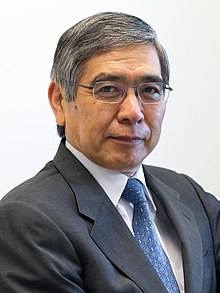Haruhiko Kuroda
| Haruhiko Kuroda | |
|---|---|
| 黒田 東彦 | |
 |
|
| 31st Governor of the Bank of Japan | |
|
Assumed office 20 March 2013 |
|
| Prime Minister | Shinzō Abe |
| Deputy | Kikuo Iwata Hiroshi Nakaso |
| Preceded by | Masaaki Shirakawa |
| 8th President of the Asian Development Bank | |
|
In office 1 February 2005 – 18 March 2013 |
|
| Preceded by | Tadao Chino |
| Succeeded by | Takehiko Nakao |
| Special Advisor to the Cabinet | |
|
In office March 2003 – January 2005 |
|
| Prime Minister | Junichirō Koizumi |
| Preceded by | Kyoko Nakayama |
| Succeeded by | Kazumasa Kusaka |
| Vice Minister of Finance for International Affairs (Ministry of Finance) | |
|
In office 8 July 1999 – 14 January 2003 |
|
| Preceded by | Eisuke Sakakibara |
| Succeeded by | Zenbee Mizoguchi |
| Director General of the International Bureau (Ministry of Finance) | |
|
In office 15 July 1997 – 8 July 1999 |
|
| Preceded by | Eisuke Sakakibara |
| Succeeded by | Zenbee Mizoguchi |
| Personal details | |
| Born |
25 October 1944 Ōmuta, Fukuoka, Japan |
| Alma mater |
University of Tokyo All Souls College, Oxford |
| Signature | |
Haruhiko Kuroda (黒田 東彦 Kuroda Haruhiko?, born 25 October 1944), is the 31st and current Governor of the Bank of Japan (BOJ). He was formerly the President of the Asian Development Bank from 1 February 2005 to 18 March 2013.
Kuroda has been an advocate of looser monetary policy in Japan. His February 2013 nomination by the incoming government of the Prime Minister Shinzō Abe had been expected. Also nominated at the same time were Kikuo Iwata — "a harsh critic of past BOJ policies" — and Hiroshi Nakaso, a senior BOJ official in charge of international affairs, as Kuroda's two deputies. The former governor, Masaaki Shirakawa, left in March 2013.
"There is plenty of room for monetary easing" in Japan, Kuroda said in a February 2013 interview, adding that the BOJ could go beyond purchasing government bonds to include corporate bonds "or even stocks". The yen, which "has fallen 10% against the dollar since Abe began his campaign in November", also fell on the news of Kuroda's nomination. However, the new governor is "expected to use his experience as Japan’s top currency official until 2003 to rebut overseas criticism that Tokyo is using easy monetary policy to drive the yen lower, triggering a war of competitive currency devaluation".Bloomberg quoted Stephen Roach, a senior fellow at Yale University, as saying about Kuroda's goals: “It’s a strong pledge from a well-intended man, but I’m not convinced it’s going to work." When Kuroda was asked the same question in his assumption of office's press conference on March 21, Kuroda said the BOJ's role is to stabilize prices, and stabilizing exchange rates is the role of the Ministry of Finance. He also said that BOJ's "Quantitative and Qualitative Monetary Easing" policy does not intend to devalue, aiming to grow out of deflation by targeting inflation. Although there was opposition from developing countries, the policy was accepted by the other developed countries in the G20 summit. However, G20 members emphasized to Japanese policymakers that it must be used domestically while highlighting the importance of a Japanese effort to reduce government debt.
...
Wikipedia
